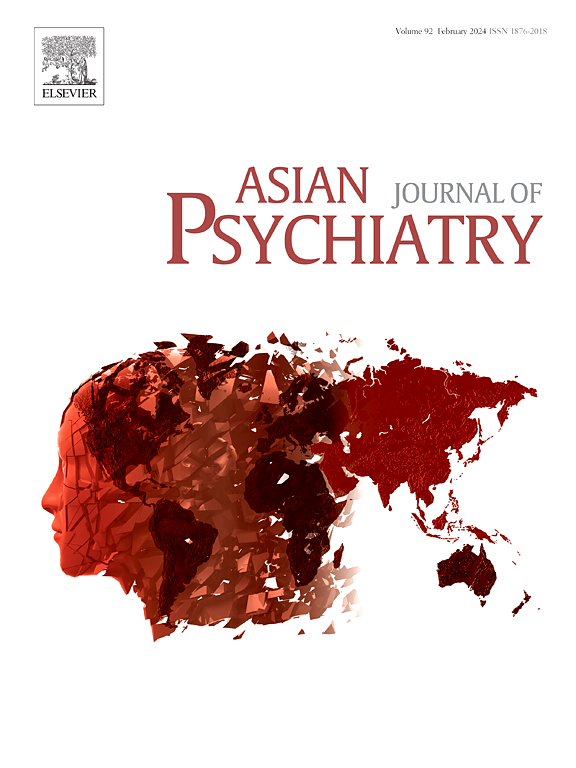心理健康知识干预和接触式教育对南印度金奈中学生心理健康知识、态度和耻辱感的影响:分组随机对照试验
IF 3.8
4区 医学
Q1 PSYCHIATRY
引用次数: 0
摘要
背景全球趋势表明,青少年心理健康失调的人数在增加,因此需要采取有效的干预措施。心理健康扫盲干预措施已显示出其益处,如改善知识、治疗理解、求助行为和减少耻辱感。本研究旨在评估综合心理健康扫盲项目对钦奈中学生心理健康相关知识、态度和耻辱感的影响。随机分组以尽量减少污染。参与学校提供同意书,并邀请所有九年级学生参与。试验获得了家长/监护人的书面知情同意,并征得了学生的同意。除拒绝参与的学生外,没有特定的排除标准。结果经调整群组效应后,干预组与对照组相比,态度评分有显著改善(平均差异为 0.85,95 % CI:0.32-1.39,p = 0.002)。结论:研究结果表明,在开展心理健康扫盲课程的同时,开展有心理障碍亲身经历者参与的接触式教育,会对学生的心理健康态度产生积极影响。虽然在知识水平和耻辱感水平上没有观察到明显的变化,但将心理健康知识普及课程与有亲身经历者的个人讲述相结合,有望解决心理健康耻辱感问题,并促进在校学生树立积极的态度。本文章由计算机程序翻译,如有差异,请以英文原文为准。
Effectiveness of mental health literacy intervention and contact-based education on knowledge, attitude, and stigma towards mental health among secondary school students in Chennai, South India: A cluster randomized controlled trial
Background
Global trends indicate a rise in mental health disorders among youth, prompting need for effective interventions. Mental health literacy interventions have demonstrated benefits such as improved knowledge, treatment understanding, help-seeking behaviors, and stigma reduction. This study aimed to assess the impact of a comprehensive mental health literacy program on knowledge, attitudes, and stigma related to mental health among secondary school students in Chennai.
Methods
Cluster-randomized controlled trial was conducted among students from four secondary schools. Randomization was at cluster level to minimize contamination. Participating schools provided consent, and all ninth-grade students were invited to participate. Written informed consent was obtained from parents/guardians, and assent was obtained from students. There were no specific exclusion criteria, except for students who declined to participate. Analyses were performed using intention-to-treat principles, with multiple imputation for missing outcome data.
Results
After adjusting for cluster effects, the intervention group showed a significant improvement in attitude scores compared to the control group (mean difference 0.85, 95 % CI: 0.32–1.39, p = 0.002). However, no significant differences were observed between the two groups in terms of knowledge and stigma.
Conclusion
The findings suggest that delivering a mental health literacy curriculum alongside contact-based education involving individuals with lived experiences of mental disorders positively influences students' attitudes toward mental health. Although no significant changes were observed in knowledge and stigma levels, the integration of mental health literacy programs with personal narratives from those with lived experiences holds promise for addressing mental health stigma and promoting positive attitudes among school students.
求助全文
通过发布文献求助,成功后即可免费获取论文全文。
去求助
来源期刊

Asian journal of psychiatry
Medicine-Psychiatry and Mental Health
CiteScore
12.70
自引率
5.30%
发文量
297
审稿时长
35 days
期刊介绍:
The Asian Journal of Psychiatry serves as a comprehensive resource for psychiatrists, mental health clinicians, neurologists, physicians, mental health students, and policymakers. Its goal is to facilitate the exchange of research findings and clinical practices between Asia and the global community. The journal focuses on psychiatric research relevant to Asia, covering preclinical, clinical, service system, and policy development topics. It also highlights the socio-cultural diversity of the region in relation to mental health.
 求助内容:
求助内容: 应助结果提醒方式:
应助结果提醒方式:


